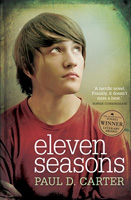 |
Paul D. Carter recently won the Australian-Vogel Literary Award for his novel Eleven Seasons. This is a rare beast, an Australian novel about sport, which follows the young career of Jason Dalton who joins the AFL team Hawthorn. The author spoke to Chris Flynn for "Readings". |
After setting out to write a sports story (inspired by the baseball prologue in Don DeLillo's Underworld), Carter quickly realised that there was more value in using AFL as a means to explore how young men mature into adulthood, or in some cases, avoid doing so: 'It's hard being young because you have no autonomy and you have a lot of anger, a lot of angst. Sport, music, fashion, having a place to go can help sublimate those feelings into a safe place, which is self-productive.' Eleven Seasons not only tackles these feelings of needing to belong but also raises vital questions about how cloistered education and young adult life can be.
'What's the difference between being a man and being an adult? Is the world of football, which is full of men, a substitute for being an adult? What is it that characterizes a man as being distinct from a boy? Richard Ford said in The Lay of the Land that being a man is all about showing hardness. I think that's pretty true. Male models never smile, Clint Eastwood never smiles, rich men on magazine covers never smile. There's a firmness, a hardness there, you've graduated from being a boy, you carry the weight of something. The best representations of masculinity often come across in performance. The characters in the book, particularly at the football club, are constantly expressing their manliness through bravado.'
